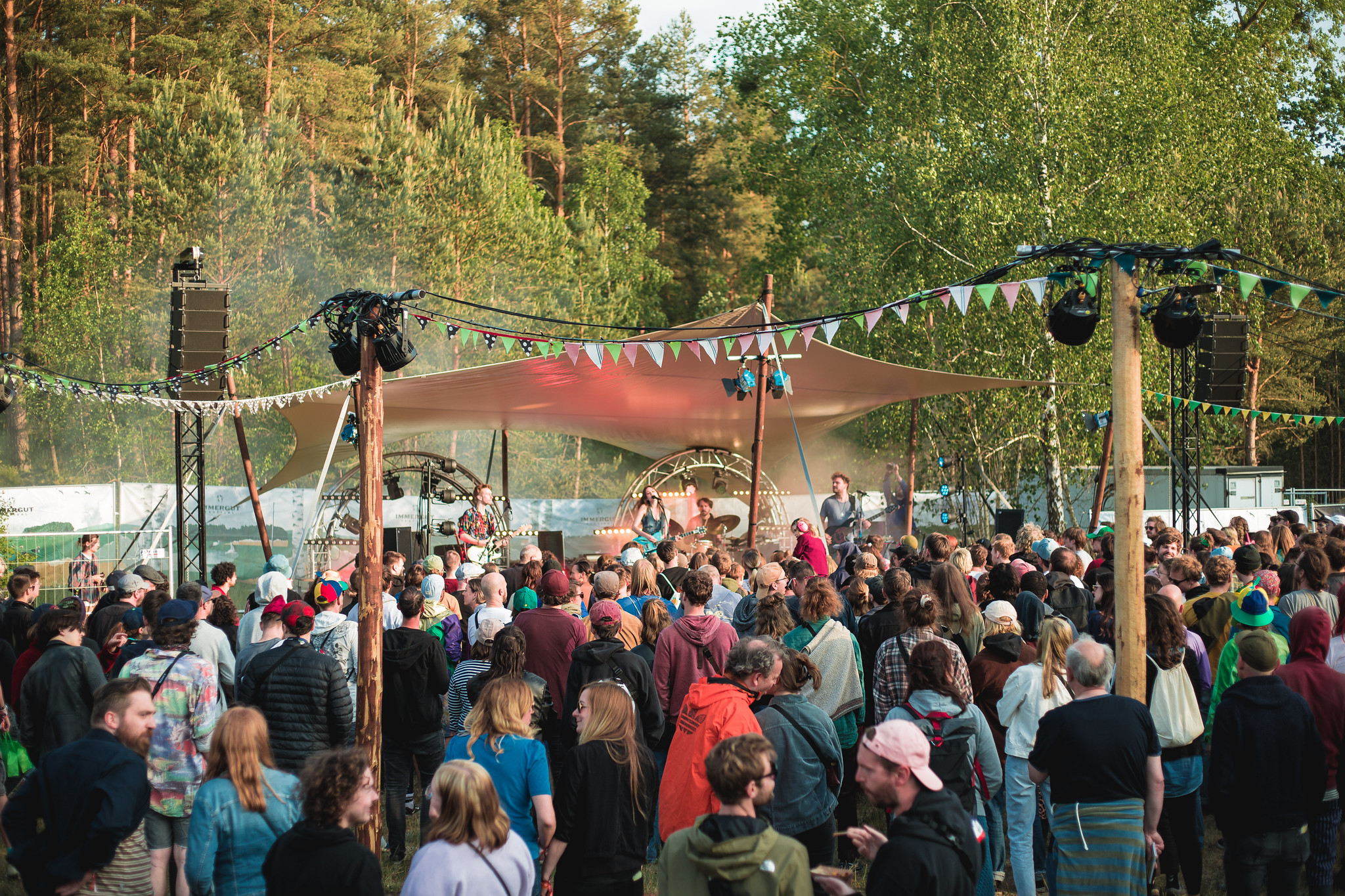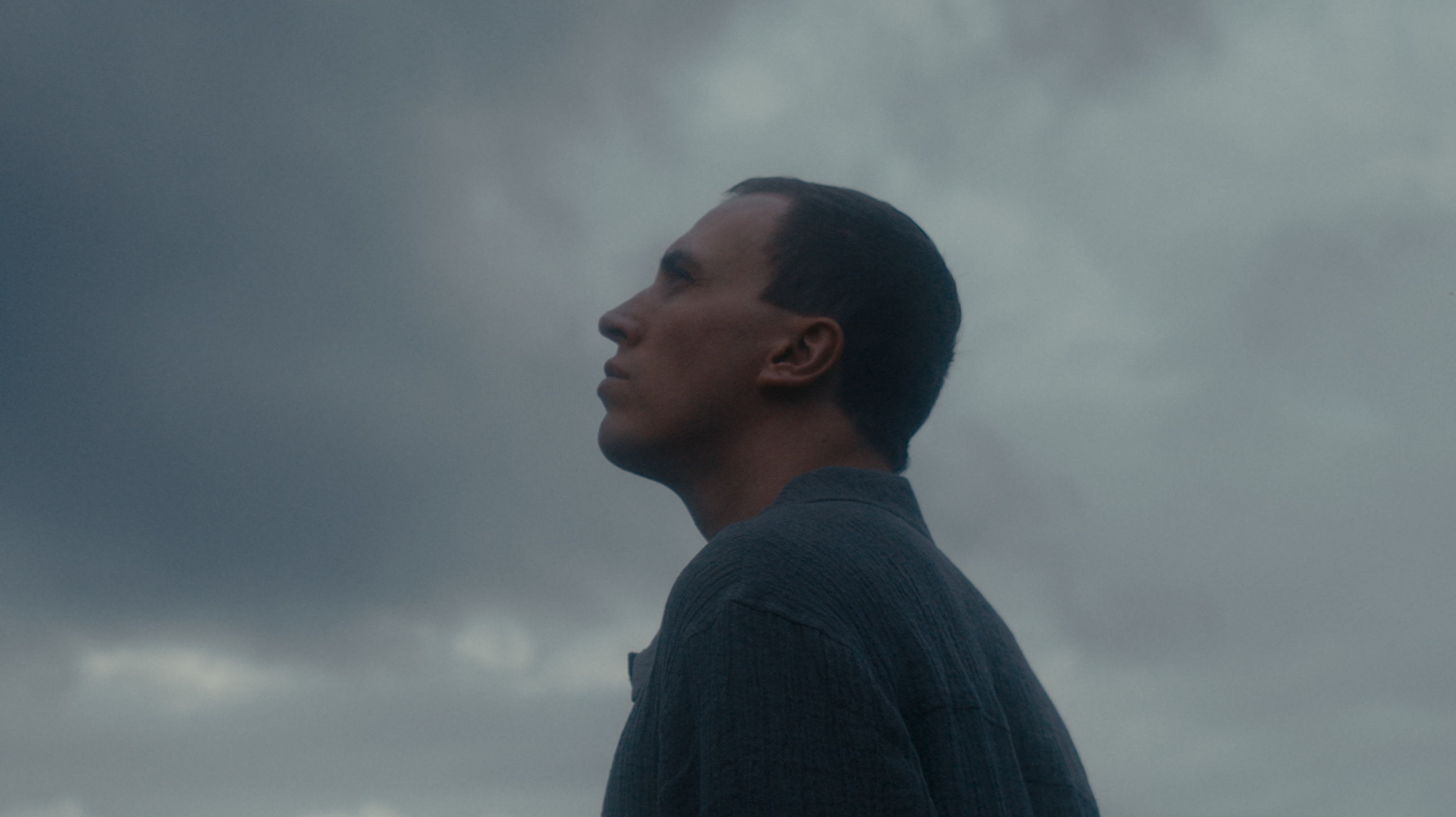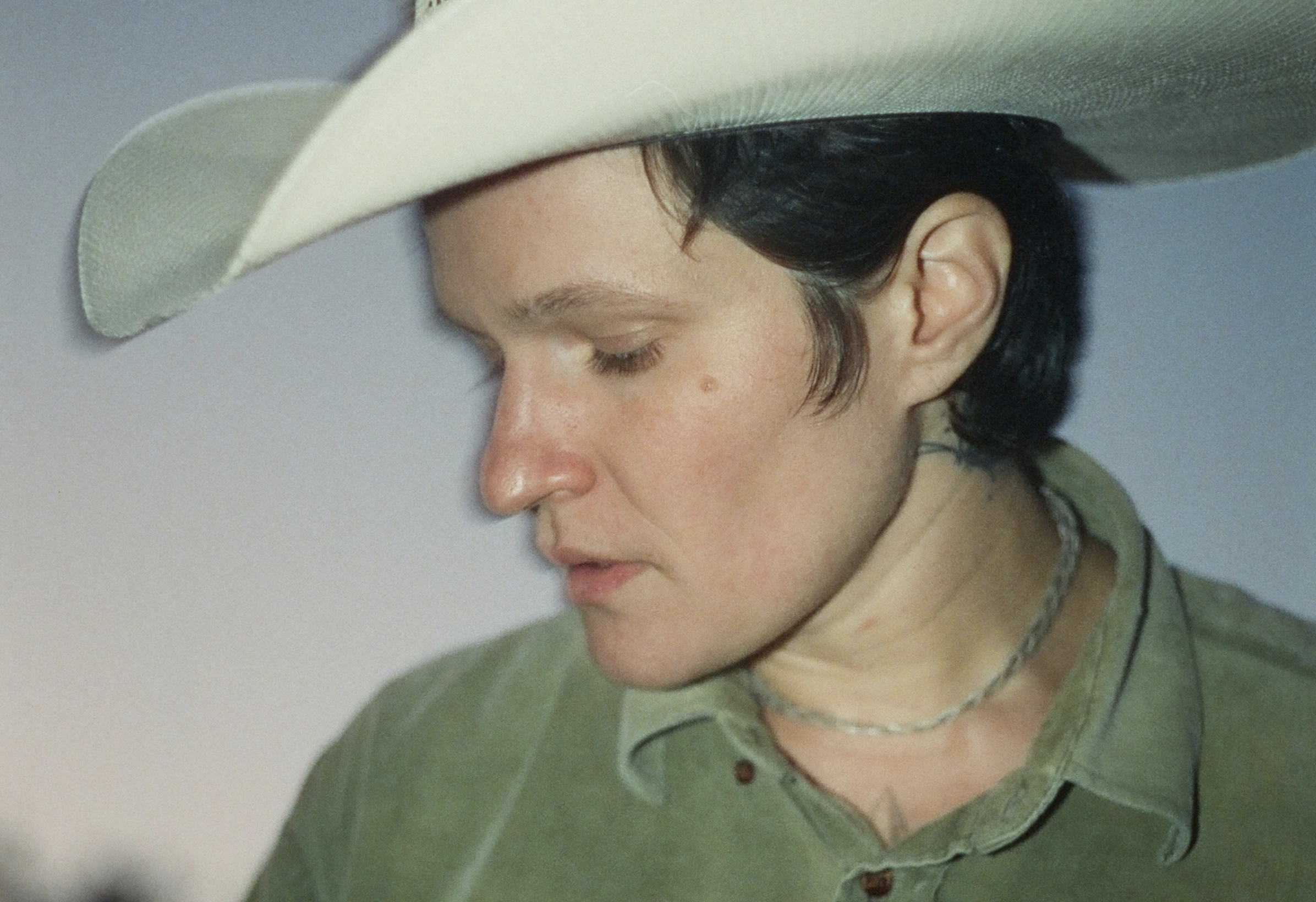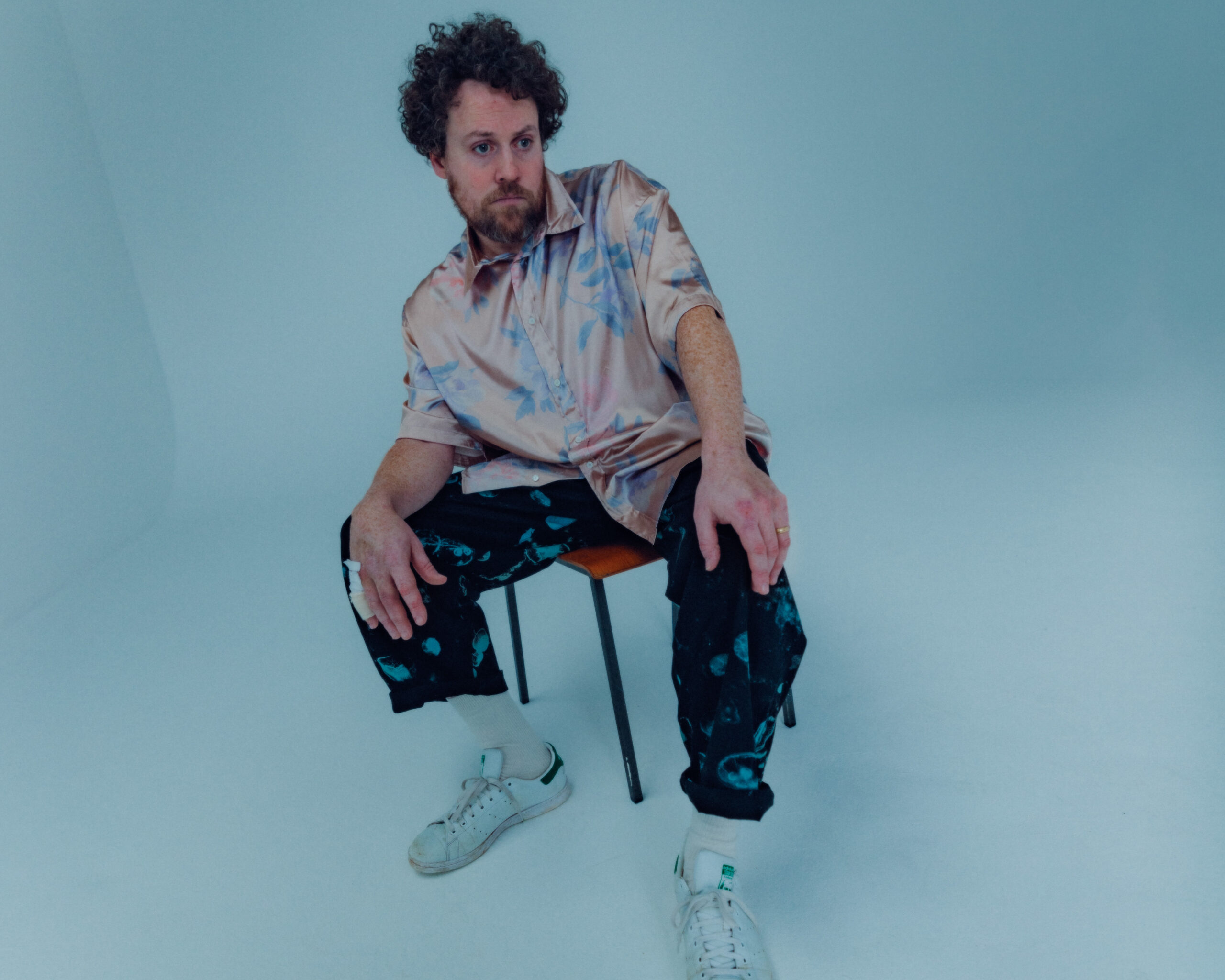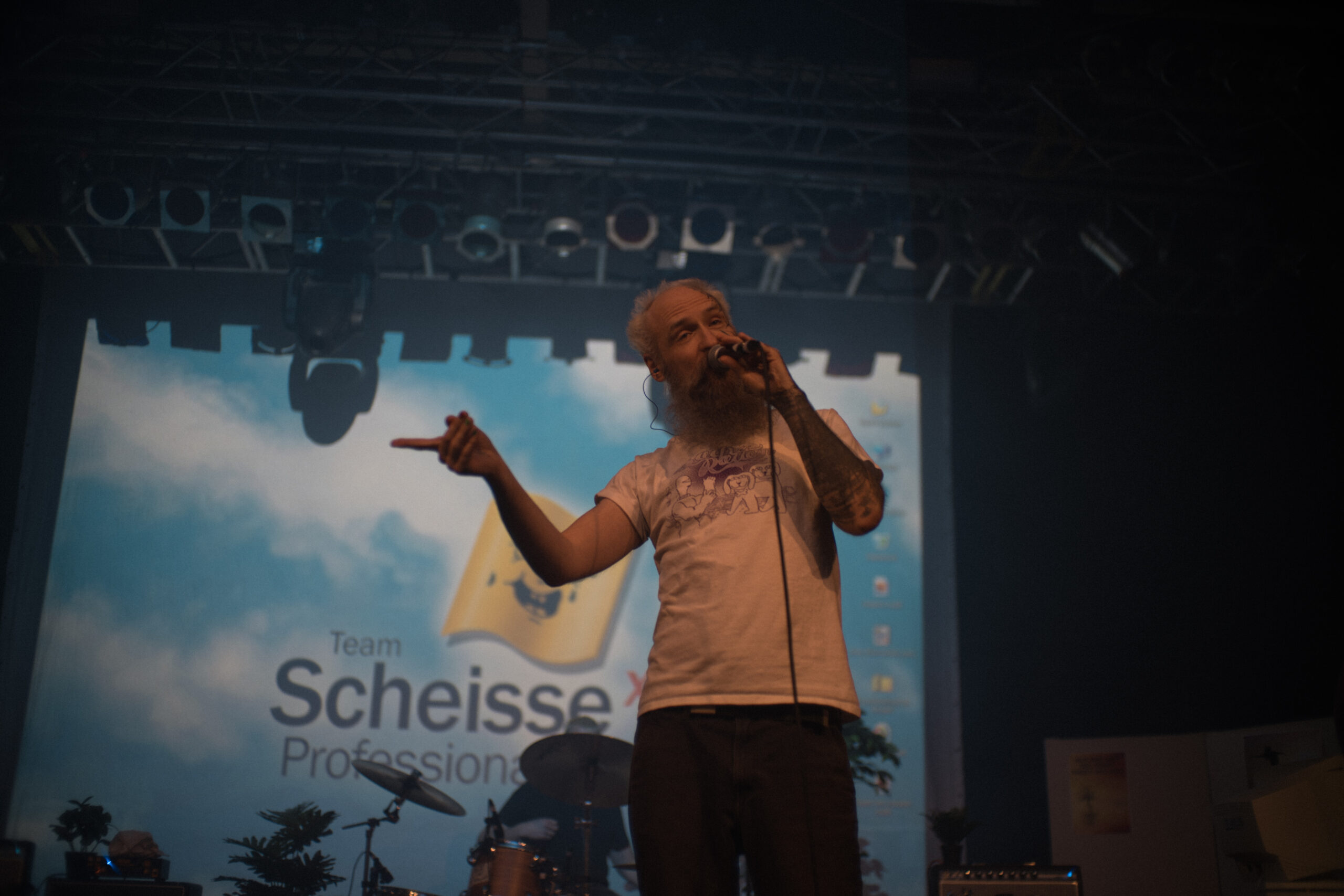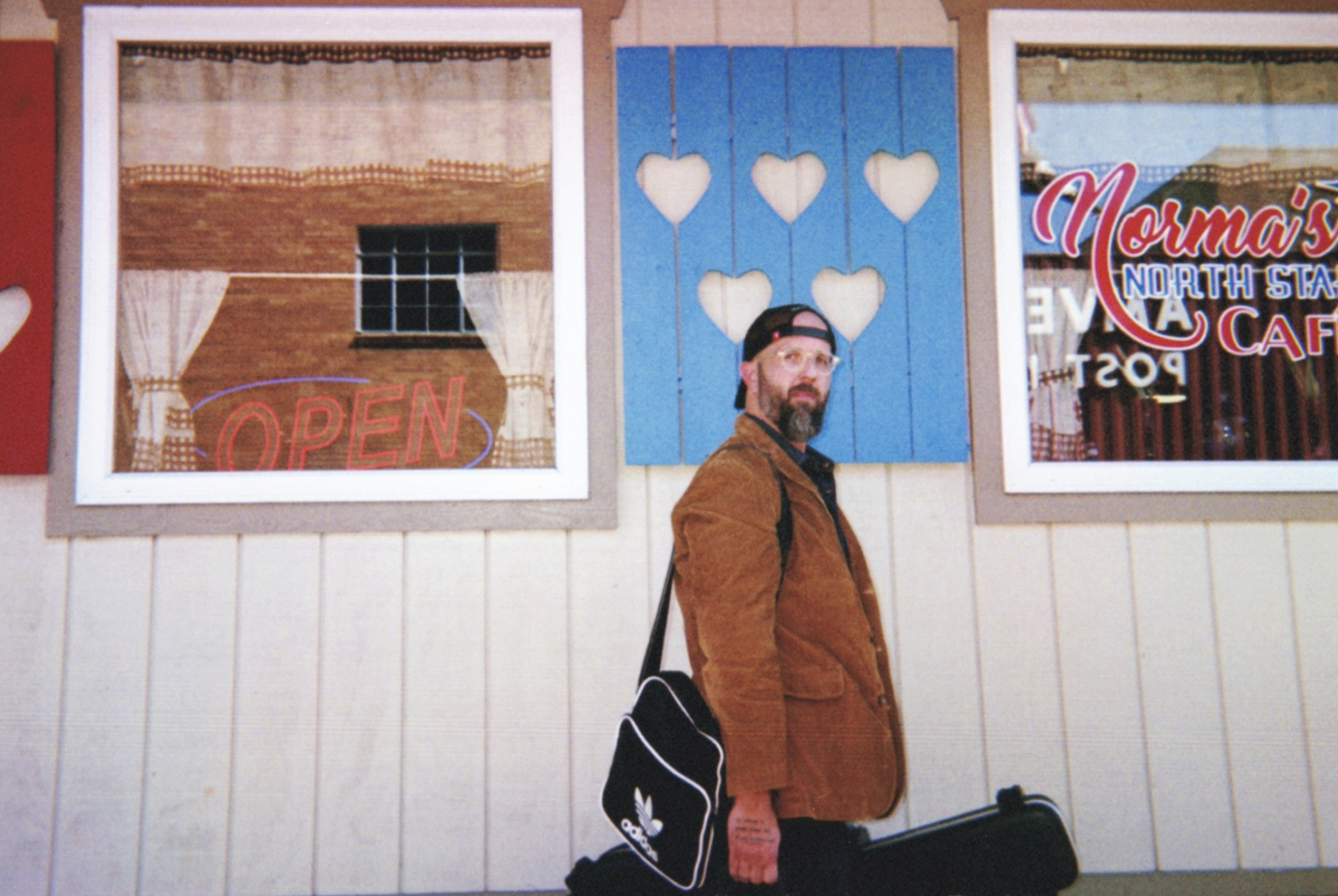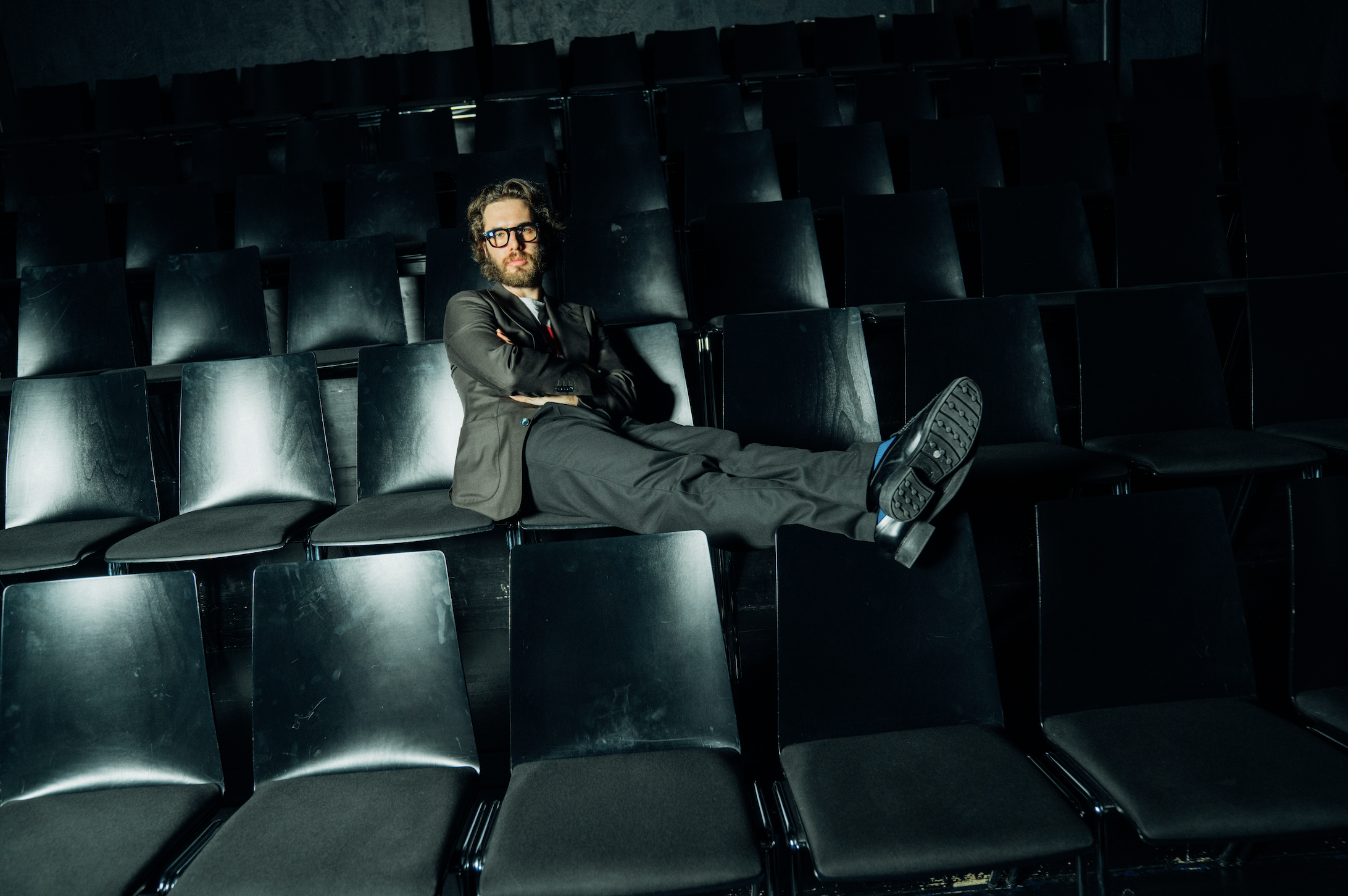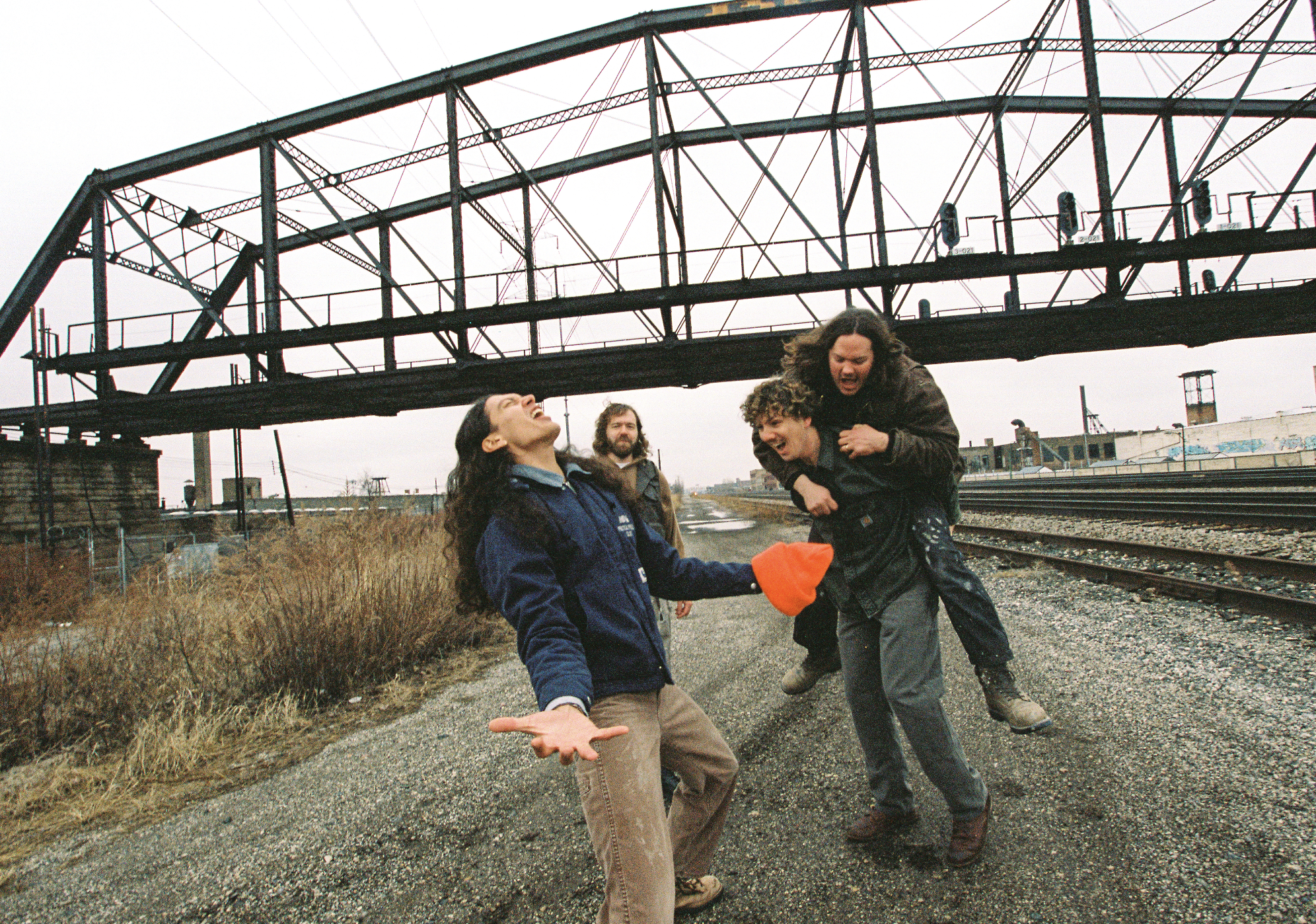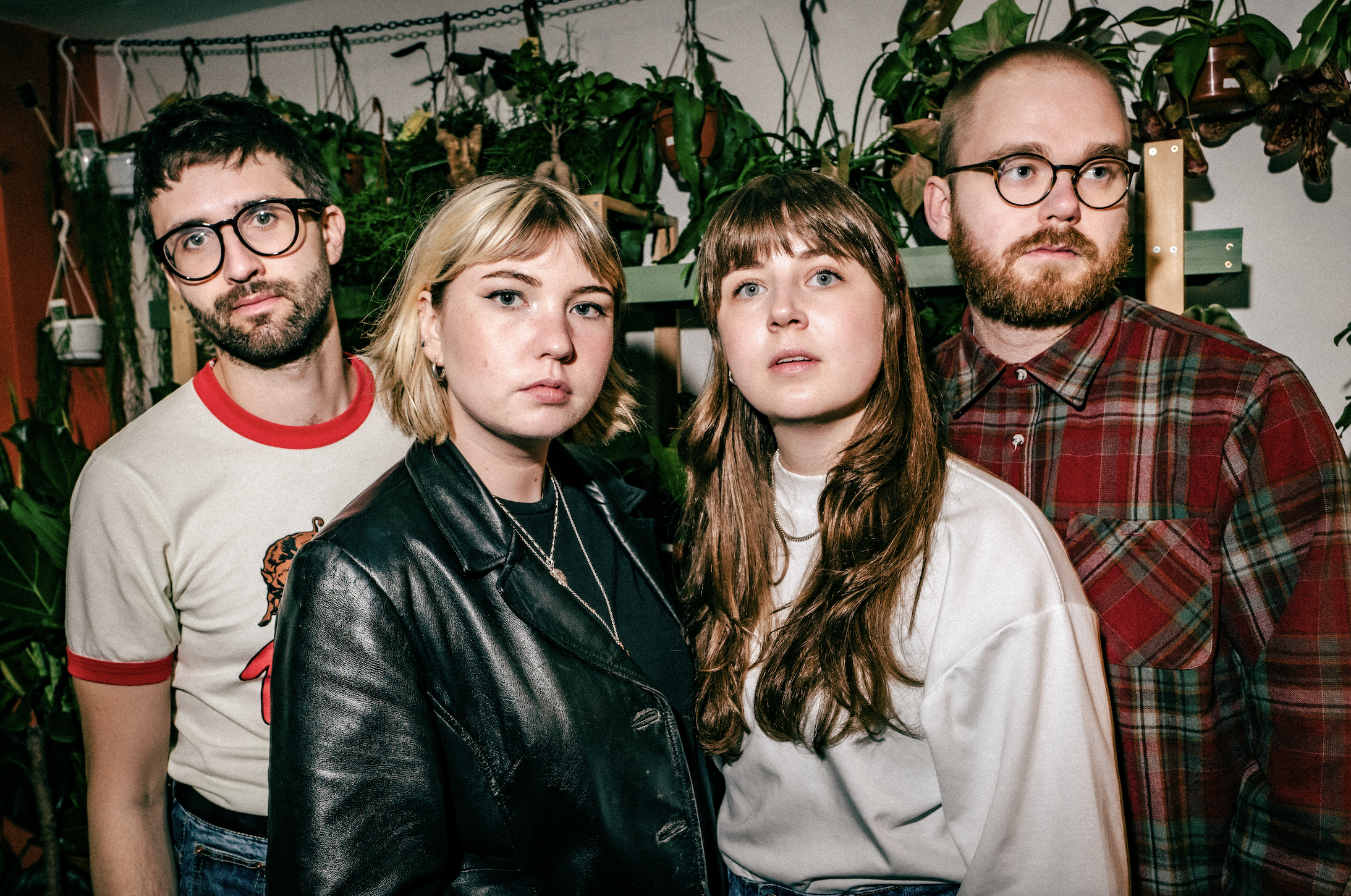Foto-© Sebastian Madej
Aufgrund ihrer berüchtigten Liveshows waren Girl Scout schon Geheimtipp, bevor sie überhaupt Musik veröffentlicht hatten. Das mit der Veröffentlichung hat sich geändert – am 27. September erschien ihre zweite EP Granny Music. Dass die Schweden als einer der aktuell heißesten Tipps gehandelt werden, nicht. Vergleiche zu Größen wie Phoebe Bridgers oder Big Thief werden gezogen, es fliegen Superlative durch den Raum. Aber wie fühlt es sich eigentlich auf der Bühne an? Und dahinter? Was geht in der Band vor, die gerade in aller Munde ist.
Beim Interview in Berlin können wir Ende August gleich alle vier Mitglieder genau das fragen. Unter unwirklichem Neonlicht einer Hotelbar sprechen wir mitten am Tag mit Emma Jansson (Gitarre, Vocals), Evelina Arvidsson Eklind (Bass, Vocals), Per Lindberg (Drums) und Viktor Spasov (Gitarre) über Erwartungen, Disziplin und Songwriting. Sie erzählen uns, warum Selbstvergessenheit und das Feedback des Publikums das Beste ist, was auf der Bühne passieren kann. Wir sprechen darüber, warum das Motiv des Abschließens und der Drang nach Neuem sowohl beim Songs schreiben als auch beim Veröffentlichen die treibende Kraft ist. Die Jagd nach der Befriedigung – für Girl Scout liegt sie im Blick nach vorn. Auf der Flucht vor der Routine sind auch Missgeschicke willkommen. Außerdem sprechen wir über die Realität des Bandlebens, warum Demotapes eine so große Rolle spielen und inwiefern sie sich mehr (Ausprobieren) und weniger (unsichtbare Adminarbeit) Freiheiten als große etablierte Bands erlauben.
 This is your first interview with Bedroomdisco. Let us start where you started. You met at the Royal College of Music in Stockholm not too long ago. When you joined that school, how did you picture your life and work? And how is that related to your reality now?
This is your first interview with Bedroomdisco. Let us start where you started. You met at the Royal College of Music in Stockholm not too long ago. When you joined that school, how did you picture your life and work? And how is that related to your reality now?
Emma Jansson: I thought I was going to be a freelance jazz singer and maybe a vocal teacher, which I find a little bit comical now because I do think that this suits me better.
Viktor Spasov: Yeah. Going into that space, you must want to try to become a jazz musician at least. You do not have to envision yourself doing it for the rest of your life. That is how I felt, at least. So, I did picture myself becoming a jazz guitarist. Which was good, because then I practiced and that was good for my guitar playing. I did not envision this, doing these rock and roll shows and falling off stages and…
Emma Jansson: …me pushing you…
Viktor Spasov: …you pushing me and cables flying all over the place. I did not know that would be it. But yeah, I am happy to be here.
Per Lindberg: It is different being in the institution, because it lowers the expectations in a way. I do not feel like anyone is dreaming of becoming a successful band or whatever. It is more of wanting to be able to get around doing music. I do not think anyone’s real ambitions is, “We are going to form a band and start touring.” It is more like, “I am going to do what I can to make this work.”
Emma Jansson: The bar is definitely lowered when you get into jazz because that is the most niche genre. There is a scene, but there is no money in it. You know that if you are going to do it, you are going to have to put in 80 hours a week and still just scrape by. You become a realist whether you want to or not.
Viktor Spasov: Whereas now, we are so rich. [everone laughs]
You also got a very extensive education. How does that influence your work now?
Viktor Spasov: I was and still am a very unfocused person and I had to learn to be focused to get through the whole school system. That is what you get from there. Or that is what I got from there. I had to focus and then I learned so much because the unfocused part of me was keeping me from all that information.
Emma Jansson: And Jazz is very technical, too.
Viktor Spasov: Yes, it is. But in terms of what we learned, doing what we are doing right now, is about breaking all these rules. I do not think about the stuff we learned when we play. I just try to have fun and make music.
Arvidsson Eklind: But we met through school. Meeting other musicians and having this passion together is a very important part of it. I do not think any of us would have met if it had not been for school.
Emma Jansson: Yeah, that is true. And playing a lot of standards and evergreens is a very good education for aspiring songwriters. You intimately learn songs that have been around for almost a hundred years and how they are so fundamental to songwriting still. You get to know those chord progressions, their harmonics, their story and the form of the song. The inner workings of it are very, very good reference points. Standard evergreens and Broadway tunes are such a fundamental of playing jazz and I learned a lot from that.

How does your songwriting work now? Is it a collective process?
Emma Jansson: Me and Viktor write most of the stuff. We do not really have one way of doing it. You [Viktor] have songs that you have written. I have songs that I have written. I have fragments that we collaborated on and vice versa. Some things we have written in the rehearsal room together, based around a riff. It is pretty fluid. There is no method. It is seeing where it goes and having faith in the journey. I think the primary method is to finish the stuff and then do whatever you want with it. But finish every song. It is easier to have five songs, whereas four of them are shitty, but they are all done, than to have 50 ideas. I just do not like that. It stresses me out. I would rather just finish; it calms me down. It does not have to be a very good song. I like that I am trained and finishing everything.
Are you constantly writing? Is it part of your life as musicians or do you have certain times for it?
Emma Jansson: I write lyrics every day, but I do not schedule it in. It just happens. Usually, I have a phrase and I write it down and then I form it into something. Musically, I usually have some point in my day when I pick up the guitar and try something. It has become a therapeutic thing. I think it calms me down and it helps me align. It grounds me and my emotions.
Viktor Spasov: I found an old phone of mine with recordings from many years ago. I realized that I was pretty much writing as much then as I am now. That stuff sucks [everybody laughs]. But I was doing it. It is not an active thing; it is a passive thing.
Emma Jansson: But there are definitely periods where I think both of us write more or less depending on what is going on in our lives. But it is always present.
Viktor Spasov: But even in those periods, I do have a couple of memos or some recordings.
Emma Jansson: Yeah. But I can have a period of a week, where I will write four songs and then I can have a period of a month, where I work on one. It is like an ebb and flow. It is not like a constant stream of masterpieces. But it is always there. At least for me.
Viktor Spasov: Yes! Most of this stuff sucks, to be honest. But then you get some good stuff.
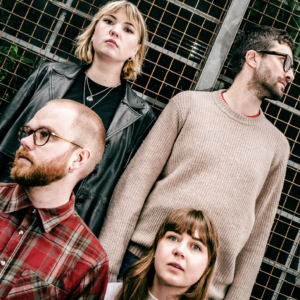 Do you instantly know if something is good? Do you bring everything to the band?
Do you instantly know if something is good? Do you bring everything to the band?
Viktor Spasov: No, I do not bring everything. If it is a really, really, really, really stable idea, I think I know it. That does not mean that it is necessarily good, but you know that it is something that people will understand.
Emma Jansson: Yeah, sometimes when something feels impactful enough just with a torn vocal, you know it is worth pursuing, and sometimes it will feel very sparse on its own and putting it into the band setting brings it to life. But in the end, you never really know which songs people will take to. My favorite songs are not people’s favorites. You have to accept that whatever control you think you have, you do not.
Let us talk about your EP Granny Music. The title, the music and the artwork create a nice clash. What was the idea behind it?
Emma Jansson: It started thematically. A lot of the songs on the record touch on childhood, growing up and age in general. There is a recording of my grandmother telling stories about her childhood in Millionaire, for example. Then we have Bruises, which is about intergenerational relationships and family dynamics and how our generation relates to the older generation. A lot of themes were already in the music. But I think it started with the thought, “Wouldn’t it be so funny if we named the EP granny music?” It is a Beatles reference to when John Lennon said that Paul McCartney only wrote granny music.
Arvidsson Eklind: And we love Paul McCartney’s music!
Emma Jansson: Yeah, we are huge fans. So, it started off as a funny idea and then we realized it actually makes sense. And it is also funny because I feel like it is the least attractive thing you can call a record.
Viktor Spasov: But it is the same thing with the previous EP [Real Life Human Garbage]. That title was a joke as well. I guess that is our thing now. Going in like, “Oh, wouldn’t it be funny to call it this. Ha ha ha ha. Okay, let’s not do that. Oh wait, that is actually really good.”
Do you play your songs live first before you record them?
Per Lindberg: Almost always, yeah.
Emma Jansson: Most of the time. Sometimes we just played them shot from the hip.
Viktor Spasov: It usually starts with a demo at a rehearsal space that is pretty well put together.
Emma Jansson: It would create a vision. There is some form of clear idea.
Viktor Spasov: Exactly. It is not just guitar and vocals. It is a full band demo. But it is a whole new process when getting into the studio.
Emma Jansson: A lot of things will change.
Arvidsson Eklind: Sometimes you like a song more if the crowd loves it. You played it live and then think, “Oh, we should record it, because people liked it.”
Emma Jansson: It is fun to have part of your repertoire still being unreleased music. Established bands will play and promote an album and then promote the next one and then they will see. Maybe some songs turn into the least favorites amongst the fans. But we get the opportunity to try things and notice when we are not getting anything from the crowd, so we will switch it up and we will try some other unreleased stuff. And it is a great way to have a little gauge of what people appreciate.

You have a pretty big reputation as a live band. What is your ideal moment on stage? What do you chase?
Arvidsson Eklind: Maybe energy. I have so much fun when the crowd is with us instead of standing far back and nodding their heads. I love when you have that interaction.
Emma Jansson: It is such a cliche, but when you are really in the moment and dropping all kind of self-consciousness and self-awareness not really knowing what you are doing physically. When I feel like we can convey that successfully and invite people in, I really like that. I love when people sing along, too. I love when you can see someone, and you can acknowledge them. It is nice when there is a very clear line of communication between the audience. I like when you can have individual interactions within the crowd just by expression, when the emotions are very clear. I think that is really cool. I love when that happens.
Viktor Spasov: I completely agree. To me, it is going deeper and deeper into the songs musically in terms of chords and harmonies. Finding these small passages that I have not heard before in the songs. I do try to try new things every time. Sometimes it ends up being stupid, but I like finding stuff inside the songs.
Per Lindberg: Well, now it is hard, because what I was thinking about is basically what all of you said.
Emma Jansson: We took all the good ones.
Per Lindberg: Yeah. There is something about getting lost in a moment and not being self-aware. I like the feeling that every thought in your head just disappears. That is rare. You are always self-aware. Especially on a stage when people are looking at you. Those few moments when you feel like you can just be.
Viktor Spasov: It is a kick.
Emma Jansson: I kind of like when things go wrong because then I feel like all expectations are off. We had a show when the mallet of the drum pedal just blew out. You could not screw it off properly. So, just in the middle of a song, it dropped several times. We had to restart the first song. I kind of like when that happens because then there is nothing to uphold.
Per Lindberg: Yeah, I get it.
Emma Jansson: Now I can just do anything because it is just like, “Okay, we had to restart the opening number of a show.” The worst case already happened. I do not have to worry about it. You just move on. I feel like we perform very well when those things happen. Not to say that I want things to go wrong every time, but I can appreciate it in hindsight. It is fun when you have to be on your feet and react and go from that. I like that rather than having…
Arvidsson Eklind: …auto pilot.
Emma Jansson: Yeah, and rehearse to a fault. I have started appreciating changing the setlist in real time just for the excitement of not doing the order that we usually do. And to see what that is like. Keeping it a little bit new.
To lose the routine?
Emma Jansson: Yeah. You do not want it to be a routine. You do not want go to work. You want it to feel fun.
Arvidsson Eklind: And some of some of these songs we have played for almost three years. It’s fun to…
Viktor Spasov: …spice it up.
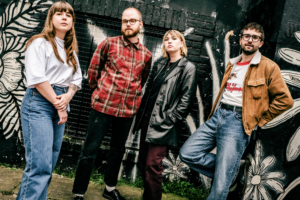 With this forward attitude, how is releasing an EP for you? For the audience it is new. For you, it is something from the past. Are you in a different headspace from Granny Music already?
With this forward attitude, how is releasing an EP for you? For the audience it is new. For you, it is something from the past. Are you in a different headspace from Granny Music already?
Emma Jansson: It is definitely still fun and feels new and interesting. In terms of the released material, I tend to move on. I can appreciate the songs, but at that point you have heard them so much that you are kind of deaf to them. Since we record and write demos regularly, the high of finishing a song is usually directed at something else by that point. We have recorded a lot of demos since the EP. I am very bad at practicing gratitude. For me it’s like, “Done. Next.” I just like chasing the satisfaction of finishing a song.
Arvidsson Eklind: I listened to the EP for the first time in a long time. We mixed it in spring and then I had not listened to it for months. And now I am like, “This is good. Yeah!”
Emma Jansson: It takes a long time to reach that. You really have to not listen to it for a while.
Arvidsson Eklind: When you are in it and listening to ten different mixes, you are like, “Oh, I’ve heard this song.”
Emma Jansson: You hate them.
Arvidsson Eklind: Yeah, now you are like, “They are really good. I am happy we did this.”
Viktor Spasov: The release itself can be so weird as well. I remember that so clearly from when we released our first ever single. It was like, “Oh, the release date is coming up. It is going to be such a big thing.” And then you wake up one morning, “Okay, it is out.” I am still at home doing what I do. It is just a day.
Emma Jansson: It is an empty feeling. I do not remember what it is called, post album blues or something. The expectation being so much of the experience that when it is out, there is nothing to put those feelings into. That is probably why I just move on.
We talked about self-awareness and progress. How is it for you to be in a band that is getting bigger: the venues are getting bigger, the promo is getting bigger? You are compared to so many bands. Are you actively aware of that? Do you step back and look at it or do you just go with it being in the thing?
Emma Jansson: I am very in the thing.
Viktor Spasov: We do a lot of shows in a lot of places, and some of them are big, some of them are huge. It is a lot of hard work that does not feel glamorous at all.
Emma Jansson: There is a lot of boring down time. I think it is perceived as a completely different thing than what we are in. Everything that’s public is…
Arvidsson Eklind: …the fun stuff…
Emma Jansson: …and our successes. And those things are there too. But there is a lot of boring admin work in between and waiting around and just writing texts and planning content. I know in my brain that it is going well, but when you are in it, it is hard to feel that, to wake up every day and be like, “The band is doing great!”
Viktor Spasov: It is a mind game that you can play with yourself for half an hour sometimes. And then you have to get back to work.
Do you feel one reason is that you have five different jobs, wearing different hats, but only one is public? The artist, the music – that is what we see. But as you said, you also have the admin work, the content creating, the promo work…
Emma Jansson: Yeah, definitely.
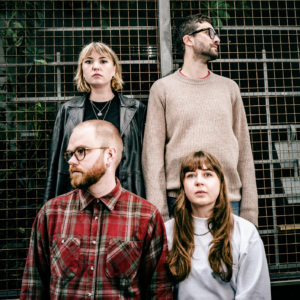 Do you think it would be easier to lose some of the jobs? Or do you appreciate the creative control that it gives you?
Do you think it would be easier to lose some of the jobs? Or do you appreciate the creative control that it gives you?
Emma Jansson: I do appreciate the creative control, but some of the things probably would not compromise that. For example, logistics do not really compromise creative vision. As long as you are aware, you do not have to be the one booking things.
Arvidsson Eklind: I have a lot of gratitude towards having a manager, booking our trips and hotels, doing the admin work. Or our booker that gets us these gigs…
Viktor Spasov: …and finds the right venues.
Arvidsson Eklind: So, we can focus on the creative things like showing up and playing what we actually do best.
Emma Jansson: We have been lucky enough to not have to do as much. If you are a completely free-lance, which we have all been, that is a different experience entirely because most of your time goes towards booking shows and emailing. We still have to do a lot of that, but booking our own shows and planing the trips, we already do not have to do that. We are very grateful for that. There are a lot of other aspects we have to deal with. But planning wise, I do want to be a band that is involved with that. You can tell the difference when bands have a complete vision, and it goes down to the little details, or when it is just a standard light show and you play the show. I appreciate when there is a bigger idea involved. I definitely want to kind of strive towards having that. But some of those hats I do not feel we would need to have.
What is the next thing you looking forward to in terms of the band?
Per Lindberg: Mainly just making more things, making more music, creating more. Us being in a small space and making music together is pretty much how the band started. That has always been the main thing that we look forward to. Doing all these demos and stuff, that is almost the most exciting bit: to create something, to get these songs for you guys and to actually watch them out and to see where they can go.
Everyone agrees?
Viktor Spasov: Yeah.
Emma Jansson: I cannot wait to go back to the studio. I have an itch to record some stuff.
That is very good news for us. Thank you for the interview!
Girl Scout Tour:
06.11.23 Wiesbaden, Kesselhaus (mit Couch Party)
07.11.23 Köln, MTC (mit Couch Party)
09.11.23 Berlin, Privatclub (mit Couch Party)
10.11.23 Weissenhäuserstrand, Rolling Stone Weekender


